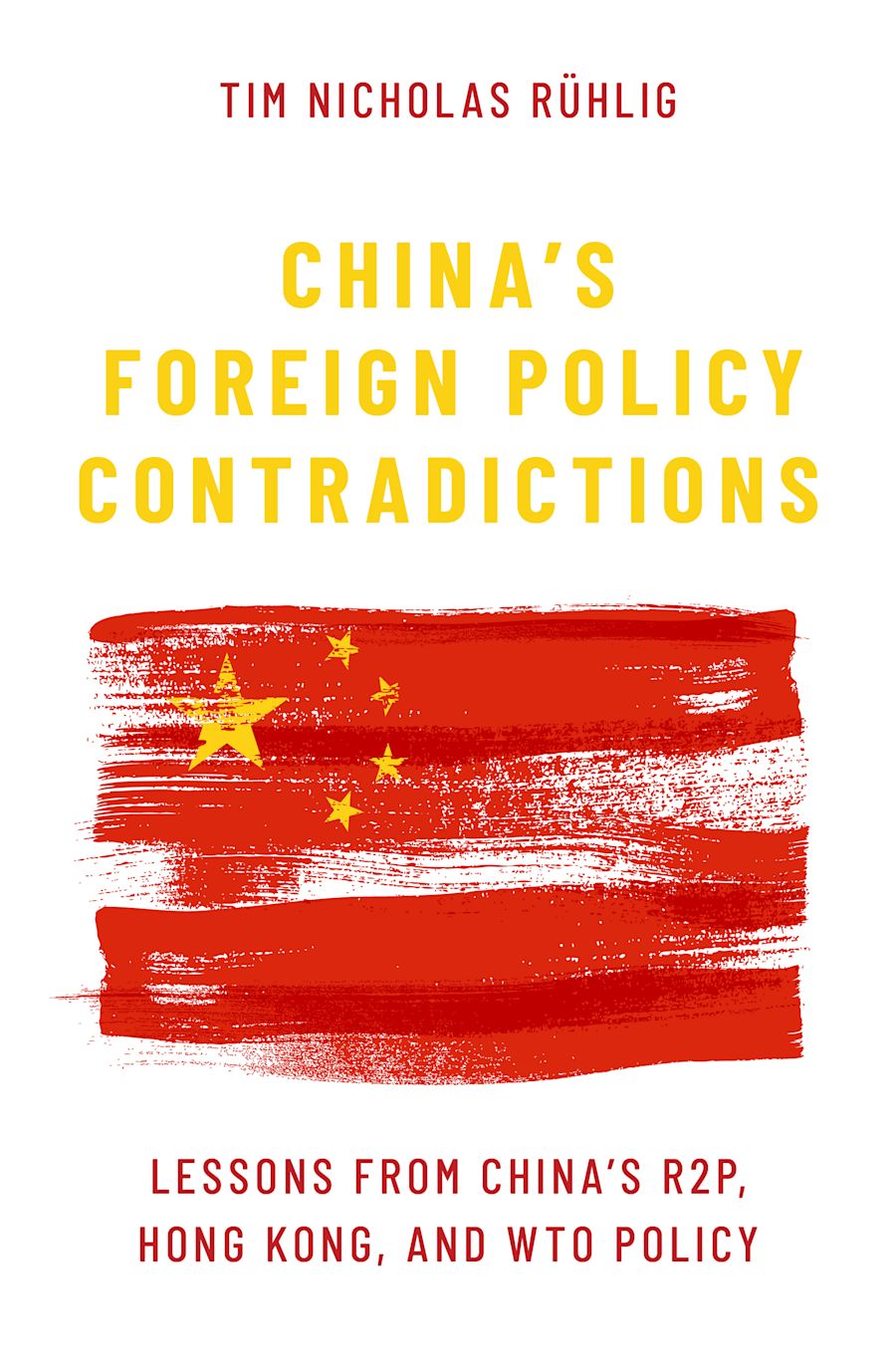Monograph: China's Foreign Policy Contradictions
I am honored to announce that my book "China's Foreign Policy Contradictions" has been published by Oxford University Press. You can purchase the hardcover and the eBook now from your preferred supplier.
The book has been launched in several cities. Please find a list of cities, ordered in alphabetical order along with some recordings of the presentations:
Berlin: 2 December 2022, 12:30-2:3 PM, German Council on Foreign Relations (DGAP) (with Jürgen Trittin, Friedolin Strack, Nadine Godehardt and Thomas Reichart).
Brussels: 25 April 2022, 10:00-11:30 AM, German Permanent Representation to the EU - by invitation only.
Copenhagen: 16 May 2022, 4:00-5:30 PM, Copenhagen University.
Frankfurt am Main, 18 October 2022, 6:30-8:00 PM, Frankfurter Salon (in collaboration with Heinrich-Böll-Stiftung Hessen, Peace Research Institute Frankfurt and the research center "normative orders" at Frankfurt University (with Kristin Shi-Kupfer, Pascal Abb and Christopher Daase).
Helsinki: 19 May 2022, 10:00-12:00, Finish Institute of International Affairs (FIIA) (with Elina Sinkkonen).
Madrid, 7 June 2022, 12:00-2:00 PM, Elcano Royal Institute (with Miguel Otero and Mario Esteban).
Paris, 30 November 2022 at Institut national des langues et civilisations orientales (Inalco) (with Juliette Genevaz and Camille Brugier)
Riga, 13 May 2022, 6:00-7:30 PM, University of Riga (with Una Berzina-Cerenkova).
Stockholm: 22 April 2022, 10:00-12:00, Centre for Global Asia at Stockholm University and Swedish Center for China Studies - by invitation only.
The Hague: 4 April 2022, 4:00-6:00 PM, Leiden Asia Centre (with Linda van der Horst, Frans-Paul van der Putten and Vincent Chang).
Order the book here and check out your preferred eBook store!
Description on the back of the cover:
Throughout the post-Mao reform era, China has championed the principle of sovereign state control, which holds that states should not intervene in the affairs of other states. Yet as Tim Nicholas Rühlig argues in China’s Foreign Policy Contradictions, in recent years they have not actually acted this way. This is not the only issue area where Chinese foreign policy actions fail to match up with official rhetoric, and these inconsistencies—in combination with China’s growing power—will have dramatic effects on the future shape of international order.
To explain these contradictions, Rühlig draws from a rich battery of in-depth interviews with party officials to explain the foreign policy dynamics and processes of the normally opaque Chinese party-state. He demonstrates how different sources of the Chinese Communist Party’s domestic legitimacy compete within the complex and highly fragmented Chinese party-state, resulting in contradictory foreign policies. He focuses on three issue areas: international human rights law and “responsibility to protect” (R2P); China’s role in World Trade Organization (WTO) policymaking; and China’s evolving relationship with Hong Kong. In each area, different factions within the party-state wrestle for control, with domestic legitimacy of the party always being the overriding goal. This incessant competition within the state’s institutions often makes the PRC’s foreign policy contradictory, undermining its ability to project and promote a “China Model” as an alternative to the existing international order (and more specifically as a champion of nonintervention). Instead, it often pursues narrowly nationalistic interests.
By elucidating how foreign policymakers strategize and react within the context of a massive and complex bureaucratic system that is constantly under pressure from many sides, Rühlig shows not only why China’s foreign policy is so inconsistent, but why it is likely to contribute to a more particularistic, plural, and fragmented international order in the years to come. This book represents a significant advance in our understanding of the foreign policymaking process in authoritarian regimes.
Blurbs:
"As the Chinese party state is enhancing its efforts to make understanding China more difficult while peddling its propaganda kool-aid of China's inexorable rise, analysing the domestic complexities, the internal contradictions and the peculiar discrepancies of China's foreign policy development becomes ever more important. Tim Rühlig's book presents an extremely valuable contribution to this important endeavour. It should be widely read around Brussels and Europe's capitals."
--- Reinhard Bütikofer, MEP, Chair of the European Parliament's Delegation for Relations with the People's Republic of China
"Liberal students of global politics rightly focus on norms but tend to see foreign policy as coherent and normative diffusion as benign. In this imaginatively designed, meticulously executed, and theoretically significant study, we see how a fragmented Chinese party-state fuels the fragmentation of norms in an already fragile international order.”
--- Prof. Nicholas Onuf, International Relations at Florida International University
"Life would be much easier if the consequences of China’s rise were simple and obvious. But they aren’t. And Rühlig skillfully unpacks the complexities and contradictions that have helped shape the evolution of China’s international actions and identity, and will continue to do so in the future."
--- Prof. Shaun Breslin, Warwick University
"Tim Rühlig’s book is a compelling analysis of the inherent contradictions in Chinese foreign policy making and provides valuable advice for all those trying to make sense of Beijing’s approach to the world. A timely contribution to the big question of how Xi Jinping’s China will shape the new global order."
--- Dr Janka Oertel, European Council on Foreign Relations


